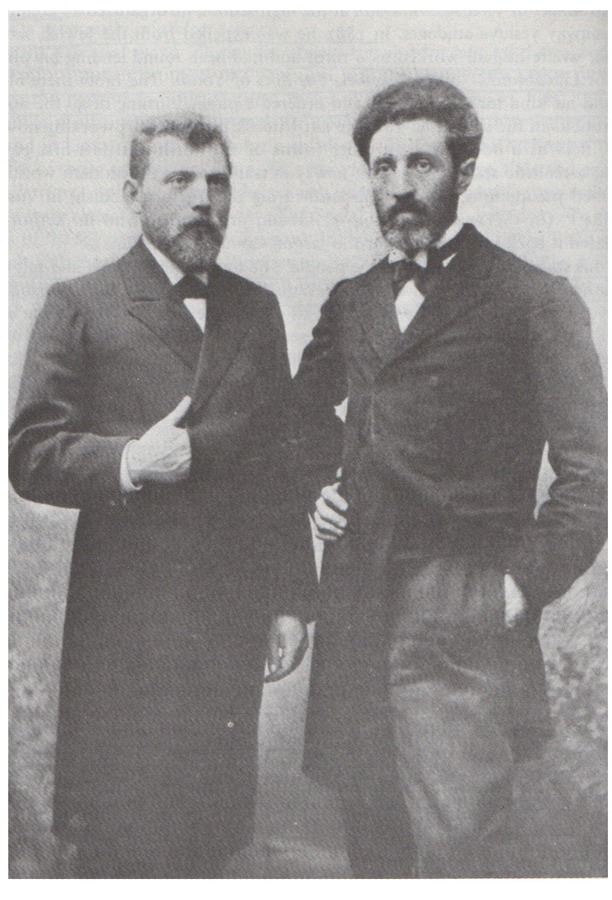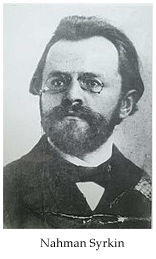THE EMERGENCE OF LEFT WING ZIONISM

Chaim Zhitlovsky (left) with his friend and fellow Social Revolutionary Zionist, An-Sky (Shloyme Zanvl Rappoport). An-Sky wrote the poem The Oath, used as an anthem by the Bund. He also wrote the well-known play The Dybbuk.
Herzl announced his 'Uganda' policy at the Sixth Zionist Congress in Basle, August 1903. Also in August he had antagonised Russian Jews by meeting the Interior Minister, Plehve, whom they saw as responsible for the events in Kishinev. In his address to the Congress he called on his Russian followers to act 'calmly and legally.' In reaction a group of left wing Zionists produced a pamphlet under the title Neither calmly not legally. A conference of left wing Zionists was held in Kiev in September 1903 and the result was the journal Vozrozhdenie (Rebirth), first printed in Paris early in 1904. Vozrozhdenie was 'territorialist', meaning that while the Jews needed a territory of their own, it didn't have to be Palestine. The position of Simon Dubnow and of the Bund, both of whom believed in their different ways that national unity was possible without a coherent territory was ridiculed, rather prettily, as wanting 'to break the barrel while wanting to keep the wine' (Frankel, p.280). But territory was regarded as a long term aspiration. In the meantime they wanted full involvement in the Russian revolutionary movement and supported national autonomy (the wine without the barrel) as an interim demand.
They were aligned with the Socialist Revolutionaries rather than the Social Democrats, believing in deliberate political action rather than economic determinism as the motivating force for historical change, and supporting 'terrorism', or at least the assassination of fomenters of the pogroms. An attempted assassination of Krushevan (8) had been supported by founder members of Vozrozhdenie in a pamphlet: 'What is the lesson of Dashevsky's assassination attempt?
(8) The role of Pavel Krushevan and his journal Bessarabets in provoking the Kishinev pogrom, as well as his possible responsibility for the Protocols of the Elders of Zion is discussed in the previous article in this series, Church and State No. 142, Oct-Dec 2020.
Zhitlovsky was converted to their long term territorialism, breaking his connection with the Bund.
In July 1904, the first of three Zionist Socialist Parties - the SSRP (Zionist Socialist Labour Party) - was formed at a conference in Warsaw attended by Poale Zion groups from Warsaw, Kiev and Dvinsk (in Latvia), together with representatives from Vozrozhdenie. In the event the populist leaning Vozrozhdenie left them early in 1905. In July 1905 an SSRP spokesman, Nachman Syrkin, attended the 7th Zionist Congress in Basle, claiming to speak as a representative for the 10,000 organised workers said to be supporting the 1905 revolution. The SSRP presented itself as the most extreme Social Democratic Marxist group, in competition with the Bund, declaring unremitting class war against the other Jewish classes. The development of capitalism necessarily, they argued, forced the Jewish proletariat in the advanced industrial countries into sweatshops. The only solution was an exodus to an undeveloped country - it didn't have to be Palestine - where a start could be made with a basically agricultural economy. Necessarily this process would have to be led by a Jewish capitalist class. The immediate task of the Social Democrats would be to defend the interests of the proletariat.
development of capitalism necessarily, they argued, forced the Jewish proletariat in the advanced industrial countries into sweatshops. The only solution was an exodus to an undeveloped country - it didn't have to be Palestine - where a start could be made with a basically agricultural economy. Necessarily this process would have to be led by a Jewish capitalist class. The immediate task of the Social Democrats would be to defend the interests of the proletariat.
Syrkin, their most distinguished spokesman, who stood for the party in the election to the 2nd Duma, Autumn 1906, was actually (and had been since the 1980s when still a somewhat precocious teenager) opposed to this sort of historical determinism. From 1888 (aged 20) to 1898 he had been a member of the Jewish Academic Society in Berlin, together with the 'Palestinophiles' (this word for the advocates of settlement in Palestine is rather ironic in the light of later developments), Chaim Weizmann and Lev Motskin, but later, at the University of Berne where, as we have seen, the Bund leadership developed its idea of national autonomy, he was expelled from the Zionist Society (an expulsion supported by Weizmann) for slandering the movement.
Following a line of argument associated with Moshe Leb Lilienblum and also with Zhitlovsky (in his pamphlet A Jew to the Jews, 1892) Syrkin argued that the position of the Jews in European society had become impossible. In Frankel's account (pp.298-9):
'The Jews had been permitted entry, or even invited, into backward and feudal societies in order to fulfil certain specific economic functions which at that time were out of bounds to the indigenous population, whether nobles, peasants or churchmen.. They had acted as intermediaries between the warrior class and its serfs, between one branch of the society and another. Despised by the upper classes and hated by the lower, they had rarely lived anything but a precarious existence. The Khmelnitsky massacres of 1648 (9) were only an extreme example of a chronic peril, a process which "runs through the whole of Jewish history like a scarlet thread."
(9) Discussed in my article in Church and State No 132, April-June 2018, also accessible at http://www.peterbrooke.org/politics-and-theology/solzhenitsyn/prologue/
'So long as there was little or no competition from within the ranks of the host nation, the Jews had usually been able to count on a measure of official protection against the popular wrath. But as soon as the indigenous nationality produced a capitalist and middle class of its own, the presence of the Jews became an historical anachronism. Sooner or later the pressure to expel them from their positions in the economy and even from the country became irresistible. It was now the turn of the Jews in the Pale of Settlement, Galicia and Roumania to suffer the fate that had overtaken the Jews in England, France and Spain hundreds of years before. By means of legislation, boycott, discrimination and violence, the rival groups within the indigenous nationalities were squeezing them out of the economic lifestream, creating a "million-headed poverty-stricken Jewish mass."'
Quoting Syrkin directly:
'"Eighty percent of the Jewish people ... is slowly losing its sources of livelihood and is doomed to disaster. The transfer to productive labour is full of obstacles and, for the most part, blocked entirely ... But apart from economic pressure, this ... mass also carries on its shoulders the nightmare of antisemitism in the government, the police, the middle class and the mob"
'And even those Jews who had become wage-earning workers were confined to the margin of the productive process, to domestic industry and sweat shops - a mere "national reserve army of the international proletariat."
'In the West, the situation on the surface was incomparably better, and many believed that democratisation, the abolition of the Pale of Settlement, the removal of the numerus clausus in education and the attainment of equal civil rights would solve the Jewish question in eastern Europe too. But, Syrkin insisted, there could be no form of self deception greater than this. Political equality, in fact, represented a double threat to the Jews: acid like corrosion within and mounting hatred without.'
Through assimilation the Jews 'invariably concentrated out of all proportion to their numbers, in the middle and upper section of the bourgeoisie as merchants, traders, professional and academics' and 'this advance up the economic ladder ... was nearly always accompanied by a deliberate attempt on the part of the Jews to divest themselves of their national heritage, to abandon the ideal of an autonomous national existence or a national mission ...'
And at the same time as they lose their own virtue as a people, their very success excites the hostility of the people round them. Quoting Syrkin directly (The Jewish question and the Jewish Socialist state, 1898): '"Not the character of the Jews, even though it is a miserable and disgusting caricature ... but the open profit motive, the hunger for the wealth of the Jews, the desire to strike the ground from under a competitor, to confiscate his property, to expel him from the country - these are the factors that make them antisemitic."'
The only solution, then, was a mass exodus to an undeveloped land. But contrary to the position later developed by the SSRP he argued that this new state had to be Socialist from the start, not because Socialism was the inevitable next stage after capitalism but on a purely voluntarist basis - that it was a moral necessity that corresponded with what was best and most necessary to be preserved in the Jewish tradition:
'"What are the Jewish works - the Pentateuch and the Prophets," he wrote in 1900, "if not a literary memorial to the class war between the haves and have-nots?" "It was this people," he declared in 1902, "that thousands of years ago said that 'there shall be no poor among you' and made social laws such as the Jubilee, the sabbatical year and all the laws on gleaning in order that justice rule in the world." "The Jewish people," he stated in a speech in New York in 1918, "is a socialist people not because it lives in want but because the revolution was declared on Mount Sinai." "Remove the socialist creativity ... from Jewish history," he declared in Jaffa, "and we are left without any reason for projecting Jewish history into the future."' (Frankel, p.306).
In 1901, he published A manifesto for Jewish youth, arguing that the Jewish proletariat needed two movements that would complement each other but still remain distinct. One, like the Bund, would support the Russian revolutionary movement; the other would press for exodus to a new land. Weizmann reading it declared it to be madness, principally because in his view the Zionist movement could only succeed by winning the favour of the existing powers and therefore had to keep well clear of any association with the Revolution. After the pogroms in Kishinev and Gomel, however, Syrkin's argument began to appear more relevant.